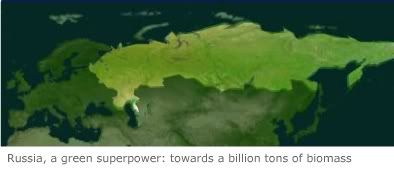Green giant Russia to produce 1 billion tons of biomass for exports

The European Union, China and to a lesser extent the US, will become increasingly dependent on Russia for their oil and gas supplies. Recent supply disruptions, caused by the gas dispute between Russia and Belarus, made the headlines because they showed how fragile Europe really is because of this dependency.
The EU's new energy policy for the 21st century (earlier post) was drawn up in part with the goal of reducing reliance on foreign energy. It is therefor betting big on biofuels, not only because the green fuels are crucial for the development of a low-carbon economy, but also because they can be produced locally and thus strengthen the security of supply.
But in the meantime, and ironically, Russia itself is beginning to understand that it is a true green giant. The country is showing signals that it will not hesitate to tap its huge bioenergy potential and help make biofuels a global commodity. Its first aim: exporting biomass... to Europe.
A billion tons of biomass
Alexej Gordejev, Minister for Agriculture of the world's largest country, announced [*German] at the EU's Green Week in Berlin (earlier post), that East-West agrarian cooperation and reform offers a tremendous opportunity for both partners in the field of green, carbon-neutral energy.
Gordejev says his country's current bioenergy production potential for exports stands at a whopping 1 billion tons of biomass per year. According to the official journal of Russia's agriculture ministry, 20 million hectares of land are immediately available for biomass production.
1 billion tons of biomass roughly equals 15 Exajoules of energy, or 2.46 billion barrels of oil equivalent, or the equivalent of 6.7 million barrels of oil per day. Russia currently produces some 9.15 million bpd of fossil oil.
According to the International Energy Agency's Bioenergy Task 40, which studies international biomass trade, the former Soviet Union and the Baltic states combined have a long-term (2050) bioenergy production potential of between 45 (min.) and 199 (max.) Exajoules per year. This equates to roughly 20.2 (min.) and 89.3 (max.) million barrels of oil equivalent per day. The maximum represents approximately the total amount of petroleum the world currently consumes as a whole.
The land Gordejev refers to, represents an area five times the size of Switzerland. According to the minister, the land in question is suitable for immediate release, because its is not needed for the production of food and fiber nor to meet local wood fuel demand. In the future, he added, Russia will study how to use its immense (boreal) forest resources for bioenergy production.
Russian-German bioenergy cooperation
Gordejev's announcement came within the context of the Roundtable on Bioenergy [*German] of the policy group on Agricultural Economics and Russo-German scientific cooperation, which was held during the same Green Week. Dr. Gerd Müller, Parliamentary State Secretary for 'Neighborly relations' (Ernährung), Economy and Consumer Protection said after the event that "cooperation on bioenergy offers great, unexplored opportunities for German and Russian entrepreneurs. We will make sure this cooperation will be beneficial to both sides." The roundatble was presided by Russia's Deputy Minister of Industry, Science and Technologies, Sergey Mitin:
 biomass :: bioenergy :: biofuels :: energy :: sustainability :: bioenergy trade :: Germany :: EU :: Russia ::
biomass :: bioenergy :: biofuels :: energy :: sustainability :: bioenergy trade :: Germany :: EU :: Russia :: The meeting was organised within the framework of the German Federal Ministry of Economic Affairs' cooperation project "Deutsch-Russischer Agrarpolitikdialog" ("German-Russian Agricultural Policy Dialogue"), which was attended by some 40 German and Russian scientists, economists and politicians.
Müller said the Russians showed great interest in German bioenergy know-how. "Our German enterprises are world leaders in the bioenergy sector and very eager to cooperate with Russia", he told reporters after the meeting. "Many concrete cooperation projects have been agreed on during this meeting and they show the large potential for future economic exchanges within the sector."
State Secretary Müller clarified that the intensification of economic relations forms a vital part of the cooperation policies of the Ministry of Economics, which are currently focused on further integration with Eastern Europe, but which will gradually draw Russia in.
In 2007, a follow-up conference on bioenergy is planned in Russia, which will tighten relations between Russia's federate states and German enterprises.
Besides the commercial and business links which were crafted during the meeting, the Deutsch-Russischen Agrarpolitikdialogs also resulted in an agreement between the Russian and German Ministeries of Economic Affairs to cooperate formally on bioenergy policies and legislation.
More information:
EuropaTicker: Deutsch-Russischer "Runder Tisch Bioenergie" - Jan. 27, 2007.
Agrigate: Bioenergie-Riese Russland - Jan. 24, 2007.
IEA Bioenergy Task 40: A quickscan of global bio-energy potentials to 2050.
 -------------------
-------------------
 Spanish company Ferry Group is to invest €42/US$55.2 million in a project for the production of biomass fuel pellets in Bulgaria.
The 3-year project consists of establishing plantations of paulownia trees near the city of Tran. Paulownia is a fast-growing tree used for the commercial production of fuel pellets.
Spanish company Ferry Group is to invest €42/US$55.2 million in a project for the production of biomass fuel pellets in Bulgaria.
The 3-year project consists of establishing plantations of paulownia trees near the city of Tran. Paulownia is a fast-growing tree used for the commercial production of fuel pellets.









0 Comments:
Post a Comment
Links to this post:
Create a Link
<< Home